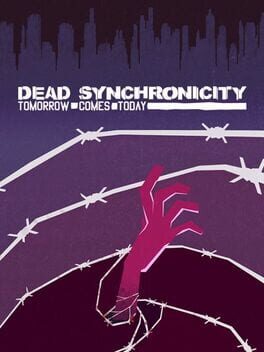'Dead Synchronicity' feels like a prologue to a much bigger story that we never got to see as the project was seemingly abandoned quickly after original release. The game ends on a cliffhanger that promises a radical turn in the setting that looks a lot more interesting than the actual game. 'Dead Synchronicity' hardly includes anything unusual when it comes to the post-apocalyptic genre: disintegration of societal structures, the cost of human life brought down to 0, survival of the fittest with the meek kept in check and taken advantage of in various ways, authorities withholding information from the citizens to keep them obedient, or the toll it takes on an individual to survive in a hostile world.
The setting includes some supernatural elements which could make this particular story stand out, however in stories about the end times I'm always more interested in how people manage to 'stay human' in such adverse conditions rather than the causes for the situation. For my liking the game focuses too much on the latter, and the information we're given about the Great Wave isn't too captivating either.
The game is extremely dark with several scenes that I thought were unnecessary - whenever you create a piece of entertainment with things like refugee camps, contagious deadly diseases or state brutality, so issues that are still causing unrest in many places, you need to be very careful in the depiction of those and I felt like 'Dead Synchronicity' lacked the sensitivity required to include them successfully.
The gameplay is pretty standard - it's a point and click adventure and most time is spent solving puzzles to get to the next area. There were a few head-scratchers that I finally solved by using every object in my inventory on every interactable piece in the background - a tactic often used in this type of game, although some solutions were so absurd they felt out of place in a game so serious in tone. I was also surprised at how underused the 'flashback' mechanic was. Throughout the game the protagonist regularly experiences flashbacks that seemingly transport him in time, but it is used only once as part of a puzzle - this could've been expanded on significantly to make the gameplay more varied.
Voice acting is highly inconsistent, with a few characters particularly strong in that regard (e.g. the protagonist Michael), while other almost comically bad (e.g. Rod and some of the children). It doesn't help that a lot of the dialogue is written in an expository manner that potentially makes it more difficult to sound natural.
One last thing - on a number of occasions the choice of music was simply horrible. I'm convinced it's a bug, because I refuse to believe that someone would purposefully deflate several tense scenes by placing some generic rock in the background.
The setting includes some supernatural elements which could make this particular story stand out, however in stories about the end times I'm always more interested in how people manage to 'stay human' in such adverse conditions rather than the causes for the situation. For my liking the game focuses too much on the latter, and the information we're given about the Great Wave isn't too captivating either.
The game is extremely dark with several scenes that I thought were unnecessary - whenever you create a piece of entertainment with things like refugee camps, contagious deadly diseases or state brutality, so issues that are still causing unrest in many places, you need to be very careful in the depiction of those and I felt like 'Dead Synchronicity' lacked the sensitivity required to include them successfully.
The gameplay is pretty standard - it's a point and click adventure and most time is spent solving puzzles to get to the next area. There were a few head-scratchers that I finally solved by using every object in my inventory on every interactable piece in the background - a tactic often used in this type of game, although some solutions were so absurd they felt out of place in a game so serious in tone. I was also surprised at how underused the 'flashback' mechanic was. Throughout the game the protagonist regularly experiences flashbacks that seemingly transport him in time, but it is used only once as part of a puzzle - this could've been expanded on significantly to make the gameplay more varied.
Voice acting is highly inconsistent, with a few characters particularly strong in that regard (e.g. the protagonist Michael), while other almost comically bad (e.g. Rod and some of the children). It doesn't help that a lot of the dialogue is written in an expository manner that potentially makes it more difficult to sound natural.
One last thing - on a number of occasions the choice of music was simply horrible. I'm convinced it's a bug, because I refuse to believe that someone would purposefully deflate several tense scenes by placing some generic rock in the background.
